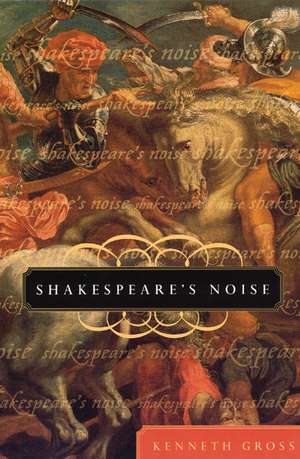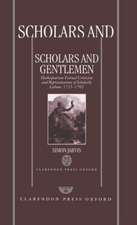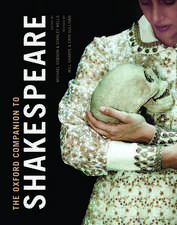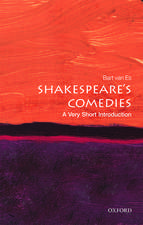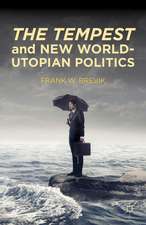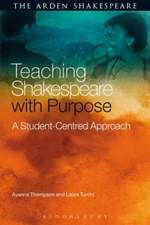Shakespeare's Noise
Autor Professor Kenneth Grossen Limba Engleză Paperback – apr 2001
"You common cry of curs! whose breath I hate / As reek o'th'rotten fens, whose loves I prize / As the dead carcasses of unburied men / That do corrupt my air: I banish you!" (from Coriolanus)
Kenneth Gross explores Shakespeare's deep fascination with dangerous and disorderly forms of speaking—especially rumor, slander, insult, vituperation, and curse—and through them offers a vision of the work of words in his plays. Coriolanus's taunts or Lear's curses force us to think not just about how Shakespeare's characters speak, but also about how they hear, overhear, and mishear what is spoken, how rumor becomes tragic knowledge for Hamlet, or opens Othello to fantastic jealousies. Gross also shows how Shakespeare's preoccupation with "noisy" speech echoed and transformed a broader cultural obsession with the perils of rumor, slander, and libel in Renaissance England.
Elegantly written and passionately argued, Shakespeare's Noise will challenge and delight anyone who loves his plays, from scholars to general readers, actors, and directors.
Kenneth Gross explores Shakespeare's deep fascination with dangerous and disorderly forms of speaking—especially rumor, slander, insult, vituperation, and curse—and through them offers a vision of the work of words in his plays. Coriolanus's taunts or Lear's curses force us to think not just about how Shakespeare's characters speak, but also about how they hear, overhear, and mishear what is spoken, how rumor becomes tragic knowledge for Hamlet, or opens Othello to fantastic jealousies. Gross also shows how Shakespeare's preoccupation with "noisy" speech echoed and transformed a broader cultural obsession with the perils of rumor, slander, and libel in Renaissance England.
Elegantly written and passionately argued, Shakespeare's Noise will challenge and delight anyone who loves his plays, from scholars to general readers, actors, and directors.
Preț: 269.59 lei
Nou
Puncte Express: 404
Preț estimativ în valută:
51.68€ • 54.24$ • 42.62£
51.68€ • 54.24$ • 42.62£
Carte tipărită la comandă
Livrare economică 23 ianuarie-06 februarie 25
Preluare comenzi: 021 569.72.76
Specificații
ISBN-13: 9780226309897
ISBN-10: 0226309894
Pagini: 304
Dimensiuni: 152 x 229 x 20 mm
Greutate: 0.4 kg
Ediția:1
Editura: University of Chicago Press
Colecția University of Chicago Press
ISBN-10: 0226309894
Pagini: 304
Dimensiuni: 152 x 229 x 20 mm
Greutate: 0.4 kg
Ediția:1
Editura: University of Chicago Press
Colecția University of Chicago Press
Notă biografică
Kenneth Gross is a professor of English at the University of Rochester. He is the author of Spenserian Poetics: Idolatry, Iconoclasm, and Magic and The Dream of the Moving Statue.
Cuprins
Acknowledgments
A Note on Texts
Introduction
1 The Rumor of Hamlet
2 The Book of the Slanderer
3 A Disturbance of Hearing in Vienna
4 Denigration and Hallucination in Othello
5 War Noise
6 King Lear and the Register of Curse
Coda An Imaginary Theater
Notes
Index
A Note on Texts
Introduction
1 The Rumor of Hamlet
2 The Book of the Slanderer
3 A Disturbance of Hearing in Vienna
4 Denigration and Hallucination in Othello
5 War Noise
6 King Lear and the Register of Curse
Coda An Imaginary Theater
Notes
Index
Recenzii
“This coolly scholarly study digs into the insults, slanders, vituperation and cursing that Shakespeare used to enliven and empower his prose. Its dark and noisy passages give defamation a good name.”
“Kenneth Gross's Shakespeare's Noise is easily among the most incisive and elegantly written books of the year. . . . Brilliantly tracking the image and force of slander in the popular imagination in the period, what is finally impressive about Shakespeare's Noise is Gross's ability to capture the ordinariness of insult, cursing, and slander, and how the destructive power of such noise informs our own most desperate moments of self-creation.”
“Kenneth Gross’s book Shakespeare’s Noise is a major contribution, not least because he is utterly fearless in thinking through the border between an interiority or subjectivity that is deep and central and its social intrication in a world that affects it at its deepest levels.”
“Shakespeare's Noise is theoretically informed, but it is an empirical rather than a theoretical book. It is grounded in Shakespeare's texts and the experience of theater. It offers sustained, insightful, and original readings of the five plays it discusses and a thoughtful exploration of the power of theater and its noise. Informative, insightful and provocative, it is also a great pleasure to read.”
"Kenneth Gross’s acute study goes beyond previous criticism in its illumination of slander, insult, and curse in five of Shakespeare’s central plays and helps chart new ways into the labyrinth of Shakespearean inventiveness."
“Language as gesture comes alive in Shakespeare’s Noise, a work redolent of the full Shakespeare brio. Gross gives a long-neglected place to the way our most healing poet is also our most wounding. One of the most original studies of Shakespeare ever to have been written, this book is a gem of strong and subtle interpretation.”
“This lively and intelligent book dwells lovingly on Shakespeare’s art of defamation in a way that provides a fascinating new perspective on his love of wordplay and his sense of awe at languages power for good and ill. The result is a brilliantly unsettling look at an essential element of Shakespeare’s greatness.”
